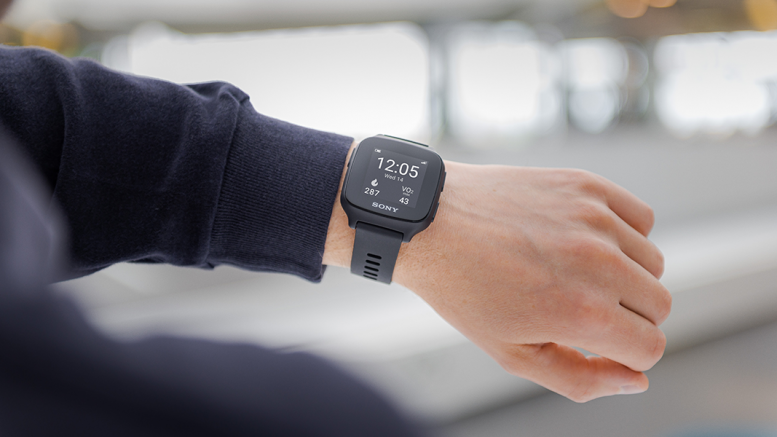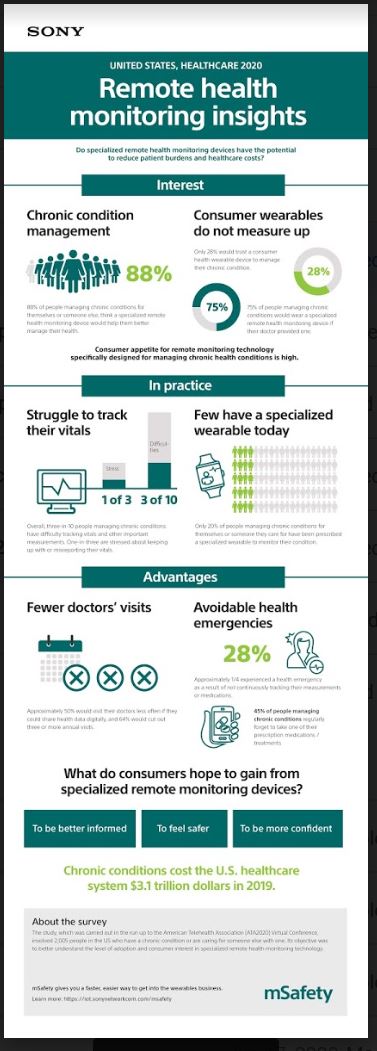Study reinforces that remote health monitoring devices hold strong potential to reduce patient burdens and healthcare costs
Sony’s mSafety Wearable Platform Division today announced findings from a study of more than 2,000 people managing chronic conditions in the United States (U.S.). The mSafety study found that nearly 90 percent of those surveyed believe they could better manage chronic conditions with a specialized remote health monitoring device.
The study, which is being published leading into the American Telemedicine Association (ATA) Virtual Conference, compiled insights on the state of adoption and interest for remote health monitoring technology aimed at helping consumers who are either managing their own chronic condition or managing the chronic condition of someone they care for.
The mSafety study also found more than half of those surveyed would consider switching doctors if they didn’t provide a specialized remote health monitoring device to one that does. Additionally, while some have questioned whether consumers would be willing to wear a specialized device specifically for a chronic condition, the study found that 75 percent would wear one, if prescribed by their doctor.
To support patients and providers in managing chronic conditions, the mSafety platform from Sony Network Communications Europe combines a connected wearable device (wristwatch) and a secure backend solution. mSafety is a B2B solution that provides partners with a ready-made, secure platform on which they can develop and scale their own unique mobile health applications or remote health monitoring solutions — while delivering valuable data to the companies that deploy mSafety.
“Chronic conditions cost the U.S. healthcare system $3.1 trillion in 2019, and the burden of ongoing treatment and compliance impacts patients and providers alike,” said Arnol Rios, Head of Network Communications Sales and Business Development in North America for Takeoff Point LLC – a Sony company. “What this study highlights is that U.S. consumers are eager to adopt remote health monitoring devices. Wearable devices — like the mSafety device — hold the potential to reduce the need for costly and complex acute interventions that don’t align with proactive, personalized care models of the future.”
Many continue to struggle with managing their chronic conditions
The mSafety study found that managing chronic conditions remains “stressful” and “difficult” despite advances in technology — particularly remote health monitoring devices and platforms. More specifically, the study found that:
-
Overall, three-in-10 people managing chronic conditions have difficulty tracking vitals and other important measurements.
-
One-in-three people managing chronic conditions are stressed about keeping up with or misreporting their vitals.
In addition, only 20 percent of people surveyed managing chronic conditions for themselves or someone they care for said they have been prescribed a specialized wearable to monitor their condition. More so, only 28 percent would trust a consumer health wearable device to manage their chronic condition — illustrating the need for more healthcare-specific remote monitoring devices.
Remote health monitoring devices hold potential to reduce patient burdens and healthcare costs
Regularly visiting the doctor for routine visits and personal health data gathering can be cumbersome and costly on patients with chronic conditions, forcing many to skip visits altogether. The mSafety study found that nearly half of people managing chronic conditions would physically visit the doctor less if they could share health data digitally, with 54 percent of those saying they would cut at least three annual visits.
However, by excluding those 65 and older, approximately 60 percent would go to the doctor in person less if they could share personal health information remotely, demonstrating that the U.S. population will increasingly demand more remote health monitoring.
Additional findings from the study reinforce the benefits of broader adoption of remote health monitoring devices, including:
-
Reduction in potential health emergencies — Approximately one out of every four (28 percent) people managing chronic conditions has had a health emergency because of not continuously tracking their measurements or medications.
-
Improved medication adherence — 45 percent of people managing chronic conditions regularly forget to take one of their prescription medications/treatments.
For more information about the study and mSafety platform, visit them at the virtual ATA conference where they will be providing two on-demand speaking sessions: The Evolution of Remote Monitoring and Health Data Ownership, Exchange and Monetization.
The study was conducted by independent brand intelligence firm Survata, analyzing data from 2,005 U.S. consumers between May 29 and June 2, 2020.


